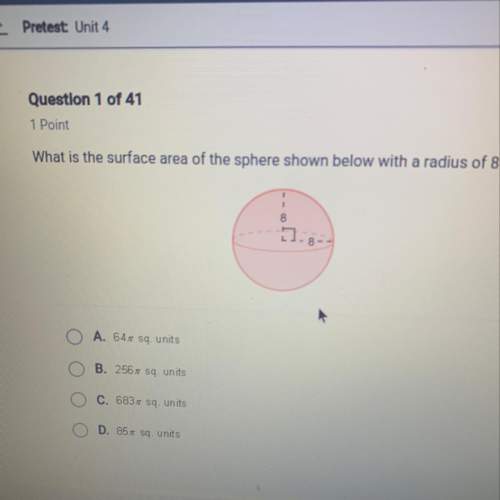
Mathematics, 29.06.2019 08:00 jayowens20
Tell if each equation represents exponential growth, exponential decay or neither. a. f(t)=2/5 (7/3)^t b. p=22(1.76)^x c. v=1/3 (0.45)^x d. w=3.2(x) e. g(x)=4.2(1/3)^x

Answers: 1


Another question on Mathematics

Mathematics, 21.06.2019 13:30
Which best describes the transformation that occurs in the graph? a) dilation b) reflection c) rotation d) translation
Answers: 2


Mathematics, 21.06.2019 20:30
The interior angles formed by the side of a hexagon have measures of them up to 720° what is the measure of angle a
Answers: 2

Mathematics, 21.06.2019 20:30
Does the function satisfy the hypotheses of the mean value theorem on the given interval? f(x) = 4x^2 + 3x + 4, [−1, 1] no, f is continuous on [−1, 1] but not differentiable on (−1, 1). no, f is not continuous on [−1, 1]. yes, f is continuous on [−1, 1] and differentiable on (−1, 1) since polynomials are continuous and differentiable on . there is not enough information to verify if this function satisfies the mean value theorem. yes, it does not matter if f is continuous or differentiable; every function satisfies the mean value theorem.
Answers: 1
You know the right answer?
Tell if each equation represents exponential growth, exponential decay or neither. a. f(t)=2/5 (7/3...
Questions





Computers and Technology, 16.02.2021 02:40

Mathematics, 16.02.2021 02:40


Mathematics, 16.02.2021 02:40






Computers and Technology, 16.02.2021 02:40



Mathematics, 16.02.2021 02:40




 represents exponential decay when
represents exponential decay when 
 represents exponential growth, because
represents exponential growth, because 
 represents exponential growth, because
represents exponential growth, because 
 represents exponential decay, because
represents exponential decay, because 
 represents neither exponential growth nor exponential decay, because this function is linear.
represents neither exponential growth nor exponential decay, because this function is linear. represents exponential decay, because
represents exponential decay, because 



